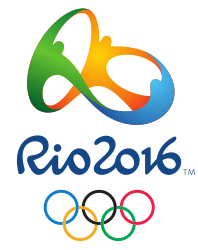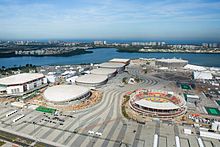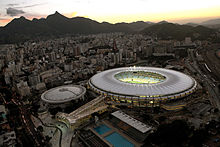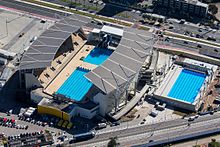This is default featured slide 1 title
Go to Blogger edit html and find these sentences.Now replace these sentences with your own descriptions.
This is default featured slide 2 title
Go to Blogger edit html and find these sentences.Now replace these sentences with your own descriptions.
This is default featured slide 3 title
Go to Blogger edit html and find these sentences.Now replace these sentences with your own descriptions.
This is default featured slide 4 title
Go to Blogger edit html and find these sentences.Now replace these sentences with your own descriptions.
This is default featured slide 5 title
Go to Blogger edit html and find these sentences.Now replace these sentences with your own descriptions.
Sunday, 7 August 2016
Saturday, 6 August 2016
2016 Summer Olympics
2016 Summer Olympics
"Rio 2016" redirects here. For the 2016 Paralympic Games, see 2016 Summer Paralympics.
OPENING CERMONY
OPENING CERMONY
 | |
| Host city | Rio de Janeiro, Brazil |
|---|---|
| Motto | A new world (Portuguese: Um mundo novo) |
| Nations participating | 206 |
| Athletes participating | 11,000+ |
| Events | 306 in 28 sports |
| Opening ceremony | 5 August |
| Closing ceremony | 21 August |
| Officially opened by | Acting President Michel Temer |
| Athlete's Oath | Robert Scheidt |
| Judge's Oath | Martinho Nobre |
| Olympic Torch | Vanderlei Cordeiro de Lima |
| Stadium | Maracanã Stadium |
| Part of a series on |
2016 Summer Olympics[show]
|
The 2016 Summer Olympics (Portuguese: Jogos Olímpicos de Verão de 2016),[a] officially known as the Games of the XXXI Olympiad, and commonly known as Rio 2016, is a major international multi-sport event in the tradition of the Olympic Games as governed by the International Olympic Committee, being held in Rio de Janeiro, Brazil. Opening rounds in certain events began on 3 August 2016—two days before the opening ceremony—and the Games is formally running from 5 August to 21 August 2016.
More than 11,000 athletes from 206 National Olympic Committees (NOCs), including first time entrants Kosovo and South Sudan, are taking part.[1][2] With 306 sets of medals, the games features 28 Olympic sports, including rugby sevens and golf, which were added by the International Olympic Committee in 2009. These sporting events is taking place at 33 venues in the host city as well as at five venues in the cities of São Paulo (Brazil's largest city), Belo Horizonte, Salvador, Brasília (Brazil's capital), and Manaus.
These are the first Summer Olympic Games under the IOC presidency of Thomas Bach.[1] The host city of Rio de Janeiro was announced at the 121st IOC Session held in Copenhagen, Denmark, on 2 October 2009. Rio became the first South American city to host the Summer Olympics. These are the first games to be held in a Portuguese-speaking country, the first to be held entirely during the host country's winter season (the 2000 games began on 15 September – five days before the Southern Hemisphere'sspring equinox), the first since 1968 to be held in Latin America, and the first since 2000 (and third overall) to be held in the Southern Hemisphere.[3]
The lead-up to these Games have been marked by controversies, including the instability of the country's federal government; health and safety concerns surrounding the Zika virus and significant pollution in the Guanabara Bay; and a doping scandal involvingRussia, which has affected the participation of its athletes in these Games
Bidding process
Main article: Bids for the 2016 Summer Olympics
The bidding process for the 2016 Olympic Games was officially launched on 16 May 2007.[4] The first step for each city was to submit an initial application to the International Olympic Committee (IOC) by 13 September 2007, confirming their intention to bid. Completed official bid files, containing answers to a 25-question IOC form, were to be submitted by each applicant city by 14 January 2008. Four candidate cities were chosen for the shortlist on 4 June 2008: Chicago, Madrid, Rio de Janeiro and Tokyo (which hosted the 1964 Summer Olympicsand will host again in 2020). The IOC did not promote Doha to the Candidature phase, despite scoring higher than selected candidate city Rio de Janeiro, because of their intent of hosting the Olympics in October, outside of the IOC's sporting calendar. Prague and Baku also failed to make the cut.[5]
Nawal El Moutawakel of Morocco headed the 10-member Evaluation Commission, having also chaired the evaluation commission for the2012 Summer Olympics bids. The commission made on-site inspections in the second quarter of 2009. They issued a comprehensive technical appraisal for IOC members on 2 September, one month before elections.[6]
Many restrictions are in place designed to prevent bidding cities from communicating with or influencing directly the 115 voting members. Cities may not invite any IOC member to visit nor may they send anything that could be construed as a gift. Nonetheless, bidding cities invest large sums in their PR and media programs in an attempt to indirectly influence the IOC members by garnering domestic support, support from sports media and general international media.
Ultimately, you are communicating with just 115 people and each one has influencers and pressure groups but you are still speaking to no more than about 1,500 people, perhaps 5,000 in the broadest sense. It is not just about getting ads out there but it is about a targeted and very carefully planned campaign.— Jon Tibbs, a consultant on the Tokyo bid[7]
The final voting was held on 2 October 2009, in Copenhagen with Madrid and Rio de Janeiro perceived as favourites to land the games. Chicago and Tokyo were eliminated after the first and second rounds of voting, respectively, while Rio de Janeiro took a significant lead over Madrid heading into the final round. The lead held and Rio de Janeiro was announced as host of 2016 Summer Olympics. Failed bids from other South American cities include Buenos Aires (1936, 1956, 1968, 2004) and Brasília, which withdrew during the 2000 Summer Olympic bidding process.
| 2016 Summer Olympics bidding results[8] | |||||
|---|---|---|---|---|---|
| City | NOC | Round 1 | Round 2 | Round 3 | |
| Rio de Janeiro | 26 | 46 | 66 | ||
| Madrid | 28 | 29 | 32 | ||
| Tokyo | 22 | 20 | — | ||
| Chicago | 18 | — | — | ||
Development and preparation
Velodrome, Carioca Arena 3, 2 and 1and Future Arena (in the background), and the Olympic Tennis Center (on the right) at Barra Olympic Park
The Maracanã Stadium and theMaracanãzinho arena (left).
Olympic Whitewater Stadium at Deodoro Radical Park
On 26 June 2011, it was reported on AroundTheRings.com that Roderlei Generali, the COO of the Rio de Janeiro Organizing Committee for the Olympic Games, resigned just one year after taking the job at ROOC. This comes just five months after CCO Flávio Pestana quit for personal reasons.[9] Pestana withdrew later during the 2012 Summer Paralympics. Renato Ciuchin was then appointed as COO.[10]
Venues and infrastructure
Main article: Venues of the 2016 Summer Olympics and Paralympics
Events will take place at eighteen existing venues (eight of which require some redevelopment), nine new venues constructed for the Summer Games, and seven temporary venues which will be removed following the games.[11]
Each event will be held in one of four geographically segregated Olympic clusters: Barra, Copacabana, Deodoro, andMaracanã. The same was done for the 2007 Pan American Games.[12][13] Several of the venues will be located at the Barra Cluster Olympic Park.[11]
The largest venue at the games in terms of seating capacity is the Maracanã Stadium, officially known as Jornalista Mário Filho Stadium, which can hold 74,738 spectators and will serve as the official Olympic Stadium, hosting the opening and closing ceremonies as well as football finals.[11] In addition, five venues outside Rio de Janeiro will host football events, in the cities ofBrasília, Belo Horizonte, Manaus, Salvador and São Paulo.[11]
The athletes' village is claimed to become the largest in Olympic history. Fittings will include about 80,000 chairs, 70,000 tables, 29,000 mattresses, 60,000 clothes hangers, 6,000 television sets and 10,000 smartphones.[14]
Olympic park
Main article: Barra Olympic Park
The Barra Olympic Park is a cluster of nine sporting venues in Barra da Tijuca, in the west zone of Rio de Janeiro, Brazil that will be used for the 2016 Summer Olympics and the 2016 Summer Paralympics. The site of the Olympic Park was formerly occupied by theAutódromo Internacional Nelson Piquet, also known as Jacarepaguá.[15]
The nine venues to be used within the Olympic Park are:[16][17] Carioca Arena 1: basketball (capacity: 16,000); Carioca Arena 2: wrestling, judo (capacity: 10,000); Carioca Arena 3: fencing, taekwondo (capacity: 10,000); Future Arena: handball (capacity: 12,000); Maria Lenk Aquatics Centre: diving, synchronised swimming, water polo (capacity: 5,000); Olympic Aquatics Stadium: swimming, water polo play-offs (capacity: 15,000); Olympic Tennis Centre: tennis (capacity: 10,000 Main Court); Rio Olympic Arena: gymnastics (capacity: 12,000); andRio Olympic Velodrome: track cycling (capacity: 5,000).
Football
Main article: Football at the 2016 Summer Olympics
Additionally some football games will take place at 5 venues in the cities of São Paulo, Belo Horizonte, Salvador, Brasília and Manaus.
Urban renovation
Main article: Porto Maravilha
Rio's historical downtown is undergoing a large-scale urban waterfront revitalization project called Porto Maravilha.[18] It covers 5 km2(1.9 sq mi) in area. The project aims to redevelop the port area increasing the city center's attractiveness and enhancing Rio's competitiveness position in the global economy. The urban renovation involves: 700 km (430 mi) of public networks for water supply, sanitation, drainage, electricity, gas and telecom; 4 km (2.5 mi) of tunnels; 70 km (43 mi) of roads; 650 km2 (250 sq mi) of sidewalks; 17 km (11 mi) of bike path; 15,000 trees; three sanitation treatment plants. As part of this renovation, a new tram will be built and will run from the Santos Dumont Airport to Rodoviária Novo Rio. It was due to open in April 2016.[19]
The Games require more than 200 kilometres of security fencing. To store material, Rio 2016 is using two warehouses. A 15,000 square metre warehouse in Barra da Tijuca in western Rio is being used to assemble and supply the furniture and fittings for the Olympic Village. A second warehouse of 90,000 square metres, located in Duque de Caxias near the roads that provide access to the venues, contains all the equipment needed for the sporting events.[14]
Technology
The Rio Olympic Games will have brand-new robotic technology created by Mark Roberts Motion Control to broaden the reach of photographers at multiple venues.[20]
It was announced 1 August 2016 that Microsoft Azure has been selected by NBC Olympics to provide cloud encoding and hosting with video workflows for NBC Olympics’ production of the Games [21]
Financing
Rio de Janeiro public transport map, including the connection with the Olympic area in Barra da Tijuca
Phase I – Applicant City
| Revenue | Federal Government | State Government | Total |
|---|---|---|---|
| Public Funds | R$3,022,097.88 | R$3,279,984.98 | R$6,302,082.86 |
| Private Funds | – | – | R$2,804,822.16 |
| General Total | – | – | R$9,106,905.02 |
Phase II – Candidate City
Public revenues
| Revenue | Public funds |
|---|---|
| Federal government | R$47,402,531.75 |
| State government | R$3,617,556.00 |
| Municipal government | R$4,995,620.93 |
| General Total | R$56,015,708.68 |





























